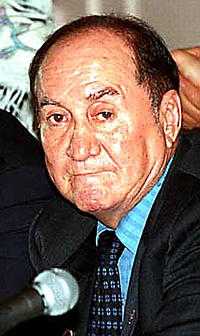| Chiefs blast Coon Come for alcohol
comments

CP Photo
Millbrook Chief Lawrence Paul, who struggles
with alcoholism, says Matthew Coon Come's comments
'cannot be backed up.'
| By Steve Proctor /
Truro Bureau
Truro - Native leaders across Atlantic Canada are calling
for the resignation of the country's most powerful chief after
he told reporters earlier this week that alcohol abuse was
common among First Nations leaders.
Lawrence Paul, co-chairman of the Atlantic Policy Congress
of First Nations Chiefs, said he was deluged with calls from
angry chiefs Wednesday. Most were demanding the resignation of
Matthew Coon Come, national chief of the Assembly of First
Nations.
"His statement was very unfair and cannot be backed up by
fact," said Chief Paul, who also serves as chief of the
Millbrook reserve near Truro.
"It's tough enough to fight the stereotype of the drunken
Indian without our national chief coming out and saying things
that aren't true."
Chief Paul said it's been about 15 years since he's seen
anything like Chief Coon Come described.
"There was a time in the late '60s to the mid-'70s (when)
there was a lot of partying going on. We used to party a lot
with Indian Affairs officials, but that was in the past and
has been corrected," he said.
He said the chiefs individually decided that they could not
make important decisions about treaties and negotiations under
the influence of alcohol or drugs.
"It's just not tolerated anymore," he said. "People are
very professional now, and I'm very proud to say that about my
people."
But Chief Paul admits that he has endured a long struggle
with alcohol abuse.
"I'm an alcoholic," he said. "I have nothing to be ashamed
of. I'm quite proud of what I've been able to accomplish even
with this addiction.
"I never said when I became chief that I was going to be
Saint Paul. I am who I am, and people here understand that I
have an addiction. They never held that against me. They
looked at what I did for my band . . . and they must have
liked it because they re-elected me nine consecutive times."
In 1995, Chief Paul was sentenced to two months in jail for
threatening to do serious harm to his brother-in-law.
Conditions of his sentence included a prohibition on using
firearms and an order to seek immediate counselling for his
drinking problem.
He received a suspended sentence in 1998 and was placed on
probation for a year after pleading guilty to assaulting his
wife in 1997.
Court heard that Mr. Paul was drunk during the incident but
was getting help at a 28-day rehabilitation program in
Kentville.
"Problems only arise when he's been drinking," court was
told.
He hasn't had a drink of alcohol in almost three years, he
said.
"I said to myself that I'm in a position where there are
crucial negotiations going on. I can't afford to have any more
relapses."
Chief Coon Come spoke about alcohol abuse among native
leaders while addressing an aboriginal health conference
Tuesday in Ottawa. In his speech he suggested native leaders
must clean up their own acts before they can truly help their
people.
"Our people smoke too much and drink too much," he told the
conference.
Outside the conference, he told The Canadian Press that
alcohol abuse among leaders of Canada's 630 First Nations is
common.
"Just attend any function, you'll see it. . . . If there's
a conference, go and see it. See who's having a dance and
who's drinking," he said.
Chief Coon Come was not available for comment on Wednesday,
but Jean LaRose, a communications officer in his office, said
the chief's comments had been taken out of context.
Mr. LaRose said Chief Coon Come only suggested that native
leaders, elected or otherwise, had to become role models by
not promoting drinking and smoking.
Chief Lawrence Toney of the Annapolis Valley First Nation
said he called Chief Coon Come's office to complain first
thing Wednesday morning but was told the chief wasn't in.
"I'm a little bit outraged," he said. "Even if there's an
apology from him, I'm not going to accept it. He has to step
down."
Chief Toney said he's never seen drunkenness at a
conference during his seven years as a chief.
"If people want a nip on their own time, that's their
business, but around the conference table, it's just not
acceptable," he said.
Chief Paul said the remarks may have been a deliberate
swipe at the country's 630 First Nations chiefs because three
months ago they blocked a plan calling for the direct election
of a national chief by all band members in the country.
"He wanted to be a super-chief with authority that would
supersede the reserve chiefs. We nixed that and now he's
getting back at us."
Chief Coon Come has never had much support in Atlantic
Canada, Chief Paul said.
His recent comments will ensure there is a call for his
resignation during the Assembly of First Nations meeting in
Halifax in June, he said.
Non-native leaders have also been vilified for making
similar statements about drinking problems among aboriginal
leaders.
Former Newfoundland premier Brian Tobin was called a racist
last June for saying alcoholism among aboriginal leaders is an
obstacle to progress.
With Patricia Brooks, staff reporter
|